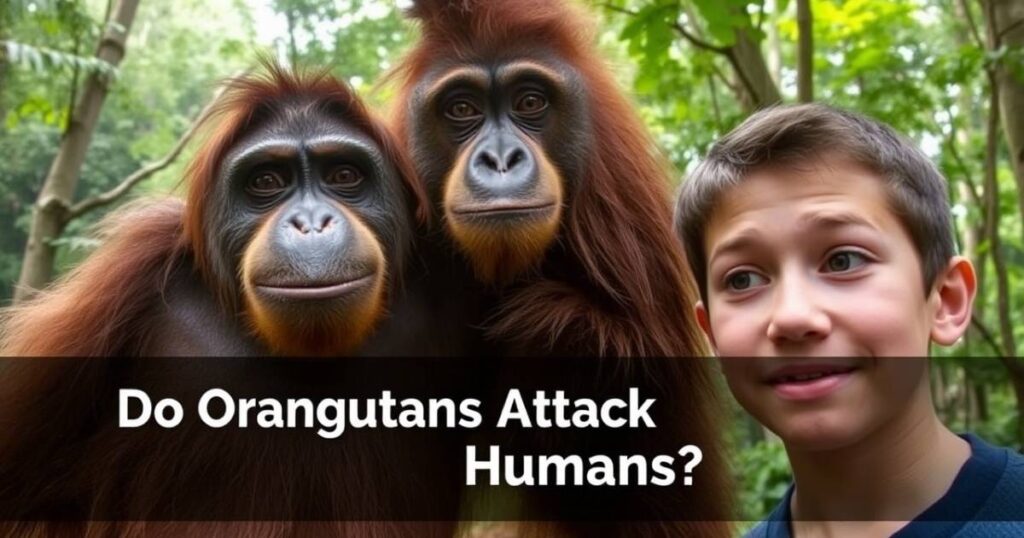Do Orangutans Attack Humans? Many people wonder if these quiet forest creatures can harm humans. They look gentle and calm, but looks can be misleading. Orangutans are strong. Very strong. In the wild, they prefer to be alone. But when they feel scared or trapped, they might act out. So, are orangutans dangerous? The answer depends on the situation.
Some people ask, “Has an orangutan ever killed a human?” While it’s rare, serious injuries have happened. Do orangutans attack humans? Yes—especially when stressed or in captivity. An orangutan attack isn’t common in the wild. But in zoos or illegal pet homes, danger can grow. These smart animals have emotions like us. When mistreated, they can get upset or defensive. So while they aren’t naturally aggressive, are orangutan dangerous in some cases? Yes, they can be. It’s best to treat them with respect and give them space.
What Are Orangutans?

Orangutans are large, reddish-brown apes that live in the rainforests of Borneo and Sumatra. They are arboreal mammals, meaning they spend most of their time in trees. Known for their long arms and gentle faces, orangutans are among the most intelligent primates on Earth.
These apes share about 97% of their DNA with humans. They use tools, solve problems, and show emotions. Orangutans live mostly alone, unlike other primates. Their slow reproduction rate makes them vulnerable. While they look peaceful, many still ask, Do Orangutans Attack Humans? Learning about their behavior helps people understand them better.
Read More: Do Pandas Attack Humans?
1. Overview of Orangutans
Orangutans are large, intelligent primates found in the rainforests of Borneo and Sumatra. In Malay and Indonesian, “orangutan” means “person of the forest.” They are known for their long, reddish-brown hair and slow movements.
These great apes are arboreal mammals, meaning they live mostly in trees. Orangutans use their strong arms to swing from branch to branch. Adult males can weigh up to 200 pounds and stand about 5 feet tall.
Their diet includes fruits, leaves, bark, and insects. Orangutans are mostly solitary by nature, unlike other primates. You’ll often see only female orangutans with offspring, as males usually live alone.
Many people ask, “Do Orangutans Attack Humans?” In the wild, they rarely attack humans. However, if they feel threatened, they can become aggressive. So yes, in certain cases, are orangutans dangerous? The answer is possibly.
It’s important to understand orangutan behavior. They are smart, emotional animals. To answer clearly, Do Orangutans Attack Humans? Only when stressed, scared, or in danger. Respect and distance help prevent problems.
2. Social Behavior of Orangutans
The social behavior of orangutans is unique compared to other primates. They are mostly solitary animals. Males live alone, while females stay with their young. This helps reduce food competition in the wild.
Adult males have large cheek pads and long calls to attract females. They avoid each other to prevent fights. The social behavior of orangutans changes slightly in captivity, where they may show more interaction due to space limits.
Female orangutans care for their babies for up to eight years. This long bond is rare in animals. A female may only have a few babies in her life. Their reproduction rate is very low.
Orangutans live around 30–40 years in the wild and up to 50 in captivity. The social behavior of orangutans often depends on age, sex, and environment. Young orangutans play more and learn survival skills from their mothers.
Understanding their behavior helps protect them better. These arboreal mammals are gentle by nature but need space and safety. Conservation efforts focus on preserving their habitats and respecting their needs.
Why Do Orangutans Attack Humans?

Orangutans are usually peaceful, but conflicts can happen when humans disturb their habitat or threaten their safety. They may act defensively if they feel cornered, stressed, or if their young are at risk. Do Orangutans Attack Humans in such moments of fear, making it important for people to respect their space and natural environment.
Orangutans rarely attack people, but it can happen under stress or fear. In captivity, lack of space or boredom may lead to aggression. When threatened, they might react to protect themselves or their young. This raises the question, Do Orangutans Attack Humans? While not naturally violent, stress and mistreatment can change their behavior, making some wonder again, are orangutans dangerous?
1. Rare Instances of Aggression
Orangutans are usually calm and shy. They live alone in the wild and avoid fights. But sometimes, rare cases of aggression happen. This makes people ask, Do Orangutans Attack Humans in certain situations?
Most aggression comes from fear or stress. When an orangutan feels trapped or threatened, it may attack. In these moments, people wonder, Do Orangutans Attack Humans even if they look gentle?
Captivity can increase the chance of aggression. Limited space, loud noises, or poor care may lead to violent behavior. In such places, Do Orangutans Attack Humans becomes a real concern for caretakers and visitors.
Orangutans in the wild rarely attack humans. They prefer trees and quiet living. But if humans get too close, especially to mothers with babies, attacks can happen.
To stay safe, people must respect their space. Learning about their needs helps reduce danger. Understanding their behavior also helps answer important questions about safety and care.
2. Common Triggers for Aggression
Orangutans are usually peaceful. But certain things can make them act out. Stress, fear, or pain can trigger attacks. People often ask, Do Orangutans Attack Humans? The truth is, they can be under the wrong conditions.
Do Orangutans Attack Humans in the wild? Rarely. But in captivity or when mistreated, they may become aggressive. Below are common triggers for orangutan aggression:
- Maternal Protection: Female orangutans with offspring are very protective. If they sense danger near their young, they may become aggressive. This behavior is natural and meant to keep their babies safe.
- Stress in Captivity: Being kept in a cage or unfamiliar setting can cause high stress. Stress can lead to sudden aggressive outbursts, especially if the orangutan feels trapped or threatened.
- Pain or Illness: Like humans, orangutans can get irritable when they’re in pain. An injured or sick orangutan may lash out more easily, especially if someone gets too close.
- Lack of Enrichment: Orangutans are intelligent animals. If they are bored or under-stimulated in captivity, they can become frustrated. This frustration can sometimes turn into aggression toward keepers or visitors.
- Past Trauma or Abuse: Rescued orangutans from the illegal pet trade may have trauma. Their past experiences can make them distrust humans. This can lead to defensive or aggressive actions when approached.
Human-Orangutan Interaction
Spending time with orangutans can be magical, but it also comes with risks. These animals are smart, strong, and sometimes unpredictable. While many are gentle, the wrong move can cause stress or fear. That’s when trouble starts. Always respect their space, and remember—they’re wild, not pets.
1. How Humans and Orangutans Interact

Humans and orangutans often cross paths in the wild and in captivity. These interactions can be peaceful or risky. Many ask, Do Orangutans Attack Humans, especially when close contact happens in sanctuaries or zoos.
In the rainforests of Borneo and Sumatra, human activity affects orangutan homes. Logging and farming force orangutans into smaller areas. This can lead to orangutan attack situations when animals feel trapped or scared.
Eco-tourism allows people to see orangutans up close. When done right, it’s safe and helps protect their habitat. Still, some visitors wonder, Do Orangutans Attack Humans, especially when orangutans act strangely or get too close.
In captivity, stress and boredom can cause problems. Do orangutans attack humans in zoos? Sometimes, yes. This happens when they don’t get enough space, mental stimulation, or care.
Sanctuaries follow special safety measures to protect both orangutans and people. Staff watch for aggression warning signs in primates and avoid risky behavior.
Orangutans are smart and emotional. Poor treatment or fear can trigger defensive animal behavior. So while they are not naturally violent, they can be unpredictable when provoked or stressed.
Respect and distance are key. When humans understand orangutan behavior, both can live peacefully. Education and conservation reduce conflict and protect these gentle, yet powerful, primates.
2. Safety Measures for Humans
Orangutans are peaceful by nature, but they can become aggressive if they feel threatened. Respect their space and follow simple safety tips to avoid unwanted encounters in the wild or captivity.
Orangutans are wild animals with strong arms and sharp teeth. Though attacks are rare, they do happen. Knowing what to do around them can help keep both you and the orangutan safe.
- Avoid Direct Eye Contact: Staring directly at an orangutan can be interpreted as a challenge. Keep your gaze calm and indirect to avoid alarming them or triggering territorial behavior.
- Stay Calm and Quiet: Loud noises and fast movements can startle orangutans. Move slowly, speak softly, and stay relaxed to avoid raising their stress levels.
- Don’t Feed Wild Orangutans: Feeding orangutans teaches them to rely on humans. This can lead to aggressive begging behavior and disrupt their natural survival skills.
- Follow Guide Instructions: When visiting sanctuaries or reserves, always listen to trained guides. They understand orangutan behavior and will help keep you safe during your visit.
- Keep Children Close: Children may unintentionally provoke a reaction by moving quickly or making noise. Always keep them nearby and under control around orangutans.
- Avoid Flash Photography: Bright camera flashes can scare orangutans. Use natural lighting or disable your flash to avoid causing distress or confusion.
Role of Conservation Efforts
Conservation plays a huge role in keeping orangutans and people safe. Groups work hard to protect forests, rescue injured orangutans, and stop illegal trade. These efforts also teach people how to live near orangutans peacefully. Saving their homes means fewer conflicts and a better future for everyone.
1. Reducing Human-Orangutan Conflicts
Human-orangutan conflict is rising due to shrinking forests. As trees disappear, orangutans enter farms or villages for food. This leads to fear, injuries, or even death—for both people and orangutans. It’s a growing problem.
Deforestation and palm oil plantations destroy orangutan homes. Without trees, these arboreal mammals have nowhere to go. They’re forced into human areas, searching for food and shelter. This creates tension and danger on both sides.
To reduce conflict, reforestation programs and wildlife corridors are key. These efforts help orangutans travel safely and stay in the forest. Protected areas and anti-logging laws also keep their habitats safe.
Education and ethical wildlife tourism help people understand orangutan behavior. Conservation organizations teach locals about safe coexistence. With better awareness and stronger protection, we can reduce violence, save lives, and support long-term human-orangutan coexistence.
2. The Importance of Protecting Orangutan Habitats
Orangutans live in the rainforests of Borneo and Sumatra. These forests give them food, shelter, and space to move. Without this habitat, orangutans can’t survive in the wild or raise their young.
Habitat loss is a big problem. Deforestation, logging, and the palm oil industry impact orangutan homes. As forests shrink, orangutans lose safe places to live. This leads to more human-orangutan conflict and possible extinction.
Protecting forests helps stop the illegal pet trade and poaching of orangutans. It also supports reforestation programs, wildlife corridors, and sanctuary guidelines. These actions let orangutans stay in the wild, where they belong.
Groups like Orangutan Foundation International and the Borneo Orangutan Survival Foundation work hard to help. They support orangutan conservation initiatives and push for anti-logging laws. Saving their home means giving these great apes a future.
3. Supporting Orangutan Conservation Initiatives

Orangutans face major threats like habitat loss, deforestation, and illegal trade. Conservation initiatives work to protect them. These programs focus on rescue, rehabilitation, and safe release back into the wild. Every effort helps survival.
Groups like Orangutan Foundation International, Borneo Orangutan Survival Foundation, and the Sumatran Orangutan Conservation Programme lead these efforts. They run rescue centers, care for injured orangutans, and raise awareness. These groups depend on global support.
Reforestation programs and wildlife corridors help rebuild the rainforests of Borneo and Sumatra. These areas give orangutans safe places to live and move freely. Anti-logging laws and protected areas also keep forests safe.
You can help too. Support ethical wildlife tourism, donate to trusted groups, or spread awareness. Every action counts. Orangutans need our help to survive. Backing orangutan conservation initiatives ensures a better future for these amazing, intelligent primates.
FAQ’S
Are orangutans aggressive toward people?
Orangutans are generally gentle and avoid humans, but stress or habitat loss can cause defensive behavior. Do Orangutans Attack Humans depends on the situation only.
Can an orangutan hurt a person?
Yes, they are very strong and can harm if provoked. Do Orangutans Attack Humans rarely, usually when threatened or protecting their young in the wild.
Why might an orangutan act aggressively?
Aggression often comes from fear, habitat destruction, or human interference. Do Orangutans Attack Humans when they feel cornered, unsafe, or disturbed in their environment.
Are wild orangutans dangerous to meet?
Wild orangutans usually keep distance from people, preferring forests. Do Orangutans Attack Humans only in rare cases, so encounters are generally safe if respectful.
How can people stay safe near orangutans?
Keep distance, avoid feeding, and respect their space. Do Orangutans Attack Humans rarely, but caution ensures both humans and apes remain safe in encounters.
Conclusion
Do Orangutans Attack Humans? In most cases, no. Wild orangutans avoid people. They are shy and peaceful by nature. But like any wild animal, they can act out when scared. If they feel trapped or stressed, they may show signs of defensive animal behavior. This can lead to an orangutan attack. These moments are rare but possible, especially in places like zoos or private homes. Stress in animals often causes changes in how they act.
So, Do Orangutans Attack Humans all the time? Not at all. But they are still wild animals with strong arms and sharp minds. You should never treat them like pets. People often ask, “Has an orangutan ever killed a human?” While no confirmed case exists, bad treatment can push them to fight back. Do orangutans attack humans? Only if they feel threatened. Respect their space, support orangutan conservation, and help keep both humans and orangutans safe.


Exceptional post however I was wanting to know
if you could write a litte more on this topic?
I’d be very grateful if you could elaborate a little bit further.
Cheers!